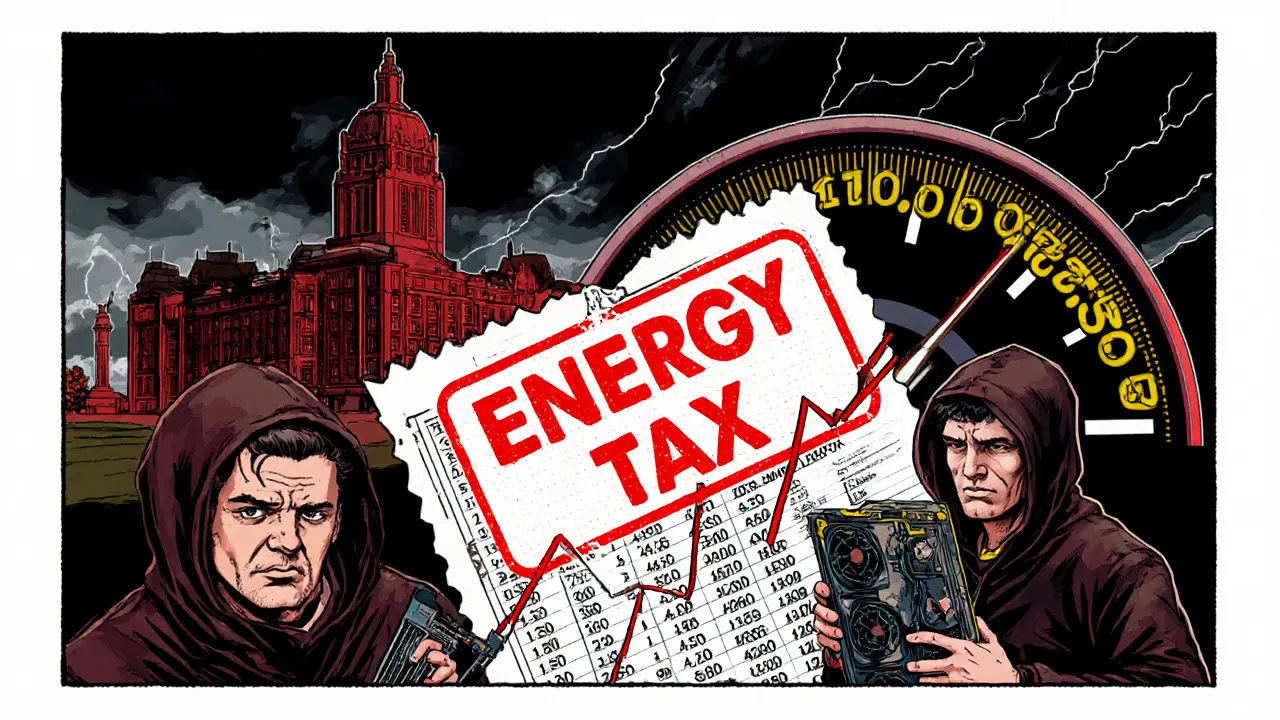Sweden Ends Crypto Mining Tax Breaks - What It Means for Miners

Crypto Mining Profitability Calculator
Mining Calculator Inputs
Results
Sweden cryptocurrency mining tax policy has taken a dramatic turn. After years of courting data‑center giants with deep tax breaks, the Swedish government ripped those incentives away and slapped miners with a punitive energy levy in July 2023. The move instantly turned the country from a rare European safe haven into a hostile environment for anyone running Bitcoin or other proof‑of‑work rigs. Below we break down what changed, why it matters, and how the industry is reacting.
How Sweden Became a Miner Magnet in the First Place
In 2017, Sweden introduced a 98 % tax reduction for data‑center operators. The incentive, officially called the Tax incentive, was aimed at attracting high‑tech investment to leverage the country’s abundant Hydroelectric power and naturally cool climate. Major cloud providers - Microsoft, Amazon, Facebook - set up facilities in the north, and crypto miners followed suit, drawn by low‑cost, renewable electricity. By 2022, roughly 150 MW of dedicated mining capacity was humming in the Swedish grid, mostly in the sparsely populated Jämtland and Västerbotten counties. The operation model was simple: power‑cheap, keep hardware cool, and cash in on Bitcoin’s price spikes. The tax break turned a modest market into a niche hub that survived even when other European regions saw digs in mining activity due to rising energy costs after the Ukraine conflict.
The 2023 Policy U‑Turn - From Sweetener to Tax Bomb
Sweden’s fiscal rethink arrived with the November 2022 budget, which announced two key changes that would bite miners:
- The 98 % reduction was scrapped entirely.
- An Energy tax on kilowatt‑hour consumption rose from SEK 0.006 to SEK 0.36 - a 6,000 % jump.
Translated to dollars, the tax went from $0.0006 per kWh to $0.035 per kWh. For a typical mining farm drawing 5 MW, the added cost balloons to about $150,000 a year, easily eclipsing any profit when Bitcoin’s price hovers below $30,000. The new levy, combined with the loss of the tax break, meant the marginal cost of mining in Sweden surged past the global average. Analysts estimate that to stay profitable, Bitcoin would need to trade at upwards of $80,000 - a level not seen since late 2021.
What the Numbers Look Like - Before vs. After
| Metric | Before July 2023 | After July 2023 |
|---|---|---|
| Tax incentive on data‑center profit | 98 % reduction | Removed - full corporate tax applies (≈ 22 %) |
| Energy tax per kWh | SEK 0.006 ($0.0006) | SEK 0.36 ($0.035) |
| Effective cost increase | ~ 0 % (neutral) | ~ 5,800 % higher energy cost |
| Estimated break‑even BTC price | $30,000‑$35,000 | >$75,000‑$85,000 |
The table makes clear why miners reacted the way they did - the policy shift is not a modest tweak but a seismic swing that flips the economics on its head.

Immediate Fallout for Mining Operators
Within weeks of the July 2023 rollout, most commercial farms announced shutdowns or relocation plans. Key pain points included:
- Stranded assets - purpose‑built cooling infrastructure and ASIC rigs, many worth several million dollars, became financially obsolete.
- Logistical costs - moving 150 MW of equipment to a new jurisdiction can cost upwards of $2 million in transport, customs, and re‑installation fees.
- Regulatory uncertainty - the sudden policy change left little time for operators to petition or seek transitional relief.
Redirection destinations gravitated toward regions with lower electricity tariffs and friendlier tax regimes: Kazakhstan, Texas, and several Canadian provinces (e.g., Alberta) saw a noticeable uptick in inbound mining hardware shipments during Q4 2023.
Sweden vs. Its Neighbors - A Comparative Lens
| Country / Region | Energy Tax (per kWh) | Corporate Tax Rate | Additional Mining Incentives | Overall Mining Attractiveness* |
|---|---|---|---|---|
| Sweden | SEK 0.36 ($0.035) | 22 % | None (tax penalty) | Very Low |
| Norway | SEK 0.02 ($0.0019) | 22 % | Limited (renewable‑energy discounts) | Low‑Medium |
| Kazakhstan | $0.004 | 20 % | Tax holidays for crypto‑related projects | High |
| Texas, USA | $0.005‑$0.008 (varies by utility) | Federal 21 % + state (0‑0.5 %) | None officially, but low‑cost power | High |
| Alberta, Canada | $0.006‑$0.009 | 12 % provincial + 15 % federal | Renewable‑energy rebates | Medium‑High |
*Attractiveness is a composite view based on tax burden, energy cost, and regulatory clarity.
Sweden now sits at the bottom of this list, confirming that its policy is more of a deterrent than a competition point.

Industry Reaction - Voices from the Frontline
Media outlets like CoinDesk called the shift “the last nail in the coffin for the industry in the region.” Operators on Reddit’s r/BitcoinMining shouted “devastating” and posted relocation roadmaps. A survey by GRN Energy showed 92 % of Swedish miners planned to exit within six months, citing the new tax as “economically unsustainable.” Even pro‑environment groups, while supportive of reducing crypto’s carbon footprint, warned that the abrupt policy could backfire by pushing mining into jurisdictions with weaker environmental oversight, potentially worsening global emissions.
Looking Ahead - Will Sweden Stay Hardline?
So far, the data supports the government’s goal: commercial mining has largely vanished. As of late 2023, industry sources confirm only a handful of small‑scale hobbyists remain, and they operate under the radar. The Swedish model is now a case study for other EU members debating similar measures. While Denmark and Finland have discussed higher levies, none have gone as far as Sweden’s 6,000 % hike. The European Commission’s upcoming MiCA regulations may eventually codify broader energy‑use standards, but the Swedish experiment shows how tax policy alone can achieve a near‑total industry exit. For miners watching the landscape, the lesson is clear: regulatory risk can eclipse even the most favorable natural resources. Diversifying locations, maintaining flexible hardware setups, and tracking policy shifts are now essential parts of any mining business plan.
Key Takeaways
- Sweden removed its 98 % data‑center tax break and introduced a steep energy tax in July 2023.
- The tax increase makes mining profitable only at Bitcoin prices well above $75,000.
- Most commercial farms shut down or moved to Kazakhstan, Texas, or Canada.
- Sweden now ranks as the least attractive EU jurisdiction for crypto mining.
- The policy is influencing broader European discussions on crypto regulation.
Did the tax change affect all crypto activities in Sweden?
No. The new levy targets energy‑intensive proof‑of‑work mining. Other crypto services - exchanges, wallet providers, and DeFi platforms - continue to operate under the standard corporate tax regime without the extra energy surcharge.
Can miners claim a refund for the tax paid before July 2023?
The Swedish Tax Agency opened a limited filing window for retroactive claims, but only on a case‑by‑case basis. Most operators focused on exiting rather than pursuing refunds.
How does Sweden’s new energy tax compare to the EU’s average electricity cost for data centres?
The EU average sits around €0.12 per kWh (~$0.014). Sweden’s post‑2023 rate of $0.035 per kWh is more than double the continental average, making it one of the most expensive spots for high‑draw mining operations.
Are there any upcoming policy reviews that might soften the tax?
The current tax is part of the 2023 fiscal budget and is slated to remain for the next five years. No public revision has been announced, though industry lobby groups continue to petition for a more balanced approach.
What should miners do if they still want to operate in Sweden?
They would need to invest in ultra‑efficient ASICs, negotiate special power‑purchase agreements, and accept that profitability only exists at very high crypto prices. Most experts advise relocating instead.
Marina Campenni
October 26, 2024 AT 09:23Sweden's abrupt tax reversal has forced many miners into a difficult position, especially those who invested heavily in the region's cheap hydropower. The sudden increase in energy costs means that operating margins have practically vanished for most farms. While the policy aims to curb energy consumption, it also risks pushing mining activity toward jurisdictions with looser environmental oversight. For those small operators still hanging on, the situation feels like an unexpected storm after a calm summer. It will be crucial for the community to share resources and support each other during this transition.
Irish Mae Lariosa
October 26, 2024 AT 17:43The Swedish government's decision to eliminate the 98 % tax break and impose an astronomical energy levy represents not merely a policy adjustment but a fundamental reversal of the incentives that originally attracted crypto mining operations to the Nordic region.
When the incentive was introduced in 2017, miners were lured by the combination of low‑cost hydroelectric power, a temperate climate that reduced cooling expenses, and a tax environment that effectively subsidised profitability.
Over the subsequent six years, this framework enabled the deployment of roughly 150 MW of dedicated mining capacity, a figure that, while modest on a global scale, created a niche ecosystem of suppliers, technicians, and ancillary services.
The abrupt removal of the tax break in July 2023, coupled with a six‑thousand‑percent increase in the per‑kilowatt‑hour levy, has annihilated the economic calculus that underpinned those investments.
A typical 5 MW operation now faces an additional annual expense of approximately $150,000, an amount that dwarfs the modest margins achievable when Bitcoin hovers below $30,000.
Consequently, the break‑even price for Bitcoin mining in Sweden has skyrocketed to well above $80,000, a threshold that has not been observed since the market peak of late 2021.
This new reality forces operators to either accept substantial losses, dramatically increase efficiency through next‑generation ASICs, or relocate to jurisdictions with more favourable tax regimes.
The relocation path is far from trivial; transporting fully assembled mining farms entails logistical challenges, customs duties, and reintegration costs that can easily exceed $2 million.
Moreover, the sudden policy shift erodes confidence not only among existing miners but also among prospective investors who now perceive Sweden as an unreliable partner in long‑term ventures.
The broader implication for the European crypto mining landscape is that other nations may hesitate to introduce similar incentives, fearing abrupt reversals that could destabilise nascent industries.
While environmental advocates may welcome a reduction in energy‑intensive proof‑of‑work activity, the unintended consequence could be a migration of mining operations to regions with less stringent environmental oversight, thereby offsetting potential carbon savings.
In addition, the loss of mining activity deprives local economies of ancillary revenue streams, such as maintenance contracts, hospitality services for technicians, and tax contributions from associated businesses.
Policymakers must therefore weigh the immediate fiscal benefits of higher energy taxes against the long‑term strategic costs of diminished technological investment and potential reputational damage.
A more measured approach could involve phased tax adjustments, transitional relief periods, or targeted subsidies for ultra‑efficient hardware, thereby preserving a degree of competitiveness while still addressing environmental concerns.
The Swedish case now serves as a cautionary tale for jurisdictions seeking to balance fiscal policy with emerging technology sectors, illustrating how abrupt regulatory swings can swiftly render a once‑thriving ecosystem untenable.
Ultimately, miners and regulators alike will need to adopt flexible strategies, diversifying locations and maintaining agility in hardware deployment to survive an increasingly volatile policy environment.
Nick O'Connor
October 27, 2024 AT 02:03Sweden's tax overhaul, while aimed at curbing energy consumption, effectively raises the cost of mining, and this shift, as analysts have noted, aligns the country with higher‑tax jurisdictions; consequently, many operators, faced with the steep levy, are re‑evaluating their positions, and some are already planning exits.
Schuyler Whetstone
October 27, 2024 AT 09:23Honestly, this whole crypto mining thing is a reckless gamble that puts profit over people, and Sweden finally had the guts to say enough is enough, even if they look like they're smacking the kids for hard work.
Pierce O'Donnell
October 27, 2024 AT 17:43Not every policy shift is a moral crusade.
Kaitlyn Zimmerman
October 28, 2024 AT 02:03If you still want to stay in Sweden look into ultra‑efficient ASIC models negotiate fixed‑rate power contracts and keep your operation small enough to stay under the tax radar.
Chris Morano
October 28, 2024 AT 10:23Staying small could indeed buy you more time and a modest setup might still break even when Bitcoin spikes so it's worth exploring.
Jessica Cadis
October 28, 2024 AT 18:43Sweden's new tax is a harsh lesson for anyone thinking they can exploit a country's resources without paying their fair share, and the world will thank them for putting miners in their place.
Shikhar Shukla
October 29, 2024 AT 03:03While the intention to safeguard national energy reserves is commendable, the precipitous nature of the levy may inadvertently encourage the relocation of mining activities to jurisdictions with less stringent oversight, thereby defeating the broader environmental objectives.
Deepak Kumar
October 29, 2024 AT 11:23Don't let this setback stall your vision; adapt, seek out low‑cost renewable hubs, and turn the challenge into an opportunity to lead the next wave of efficient mining.
Matthew Theuma
October 29, 2024 AT 19:43Life's a bit like mining – you hash through darkness hoping for a bright block 🌟, but sometimes the biggest reward is the grind itself 😅.
Carolyn Pritchett
October 30, 2024 AT 04:03Wow, that deep‑thought crap is exactly what the crypto crowd needs-more useless poetry and less actual profit.
Jason Zila
October 30, 2024 AT 12:23What concrete steps can miners take now to mitigate the tax impact without sacrificing too much hash power?
Cecilia Cecilia
October 30, 2024 AT 20:43The community's resilience will determine how quickly it adjusts to the new fiscal landscape.